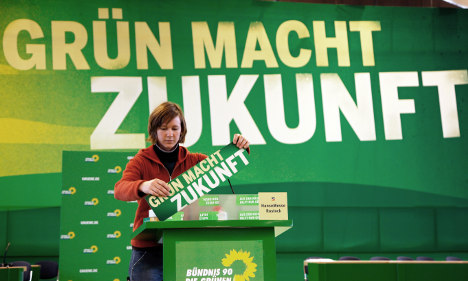Gerhard Schröder once described the relationship between the Social Democrats (SPD) and Die Grünen (Green Party) as that of "cook and waiter": the big Volkspartei (People's Party) would formulate policy while the junior partner the Greens would help sell it to its affluent constituency. Well, now, as The Economist points out, the roles could be reversing:
The Greens are riding higher in polls than ever. In elections next year they could take charge of one or even two state governments for the first time. That would be a big shift. Post-war German politics has been ruled by the Christian Democratic Union (CDU) and the Social Democratic Party (SPD), which usually form majorities by recruiting smaller partners (the CDU now governs with the liberal Free Democratic Party, or FDP). But the big parties’ share of the vote has been declining for years. In Baden-Württemberg, a CDU stronghold that holds elections in March, and in Berlin, an SPD fief that votes next autumn, the Greens are ahead of the SPD (one poll says they have also closed the gap nationally). This threatens to upend the traditional hierarchy of the centre-left parties.
The most recent polls put the Greens slightly ahead of the SPD nationally:
The 30-year-old Green Party in Germany appeared to have broken a major barrier on Wednesday as a poll suggested it has surpassed the older Social Democratics as the country's most popular opposition party.
The poll, conducted by Berlin-based pollster Forsa and sponsored by Stern magazine and private broadcaster RTL, found that 24 percent of Germans would vote for the Greens in an election, up one percentage point from last week. The Social Democrats (SPD) dropped two points to 23 percent.
The Greens are simply on the right side of some key issues that concern voters. They promote renewable energy, while Angela Merkel and her CDU want to extend the life of nuclear power plants and build underground nuclear waste storage facilities. In Stuttgart, Cem Özdemir of the Greens has been a fearless opponent of the unpopular "Stuttgart 21" railway construction project. Many Germans – not just Stuttgarters – have been appalled at the heavy-handed way the government has dealt with the project and the growing crowds of protesters. Still, outside of environmental issues, do the Greens have a coherent policy for governing at the national level? Not everyone is convinced. For examble, the editors of Die Tageszeitung see no real substance:
"The Greens are more popular than ever before, but why?… They are mainstream, but also a little bit alternative; accountable but also not out of place at demonstrations; a little bit neo-liberal, but in favor of a Green New Deal. They have arrived in the political center, but they are also a bit different. They are still opinion leaders when it comes to the environment, but nowhere else. Seldom has a party been so successful for no reason."
"Surely some of the Greens' recent success is fleeting and a result of the current situation. The Greens are profiting from a diffuse disgust with Germany's party landscape and are, like a sponge, absorbing dissatisfied voters from both the left and the right. Plus, the rhythm of political mood swings has become quicker. Not long ago, it was the FDP that was way up high, today it is the Greens, tomorrow others will take over. It is thus a mistake to call the Greens a party of the people. They are nothing more than a relatively small niche party made up of public officials, teachers and entrepreneurs and excluding blue-collar workers and the unemployed. Just what will remain of their current high in the end remains to be seen."


